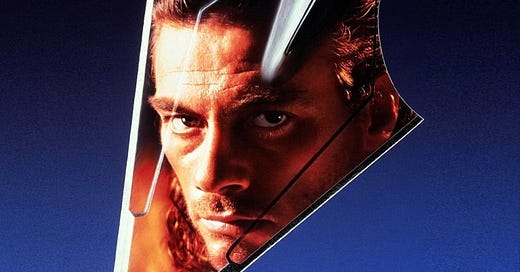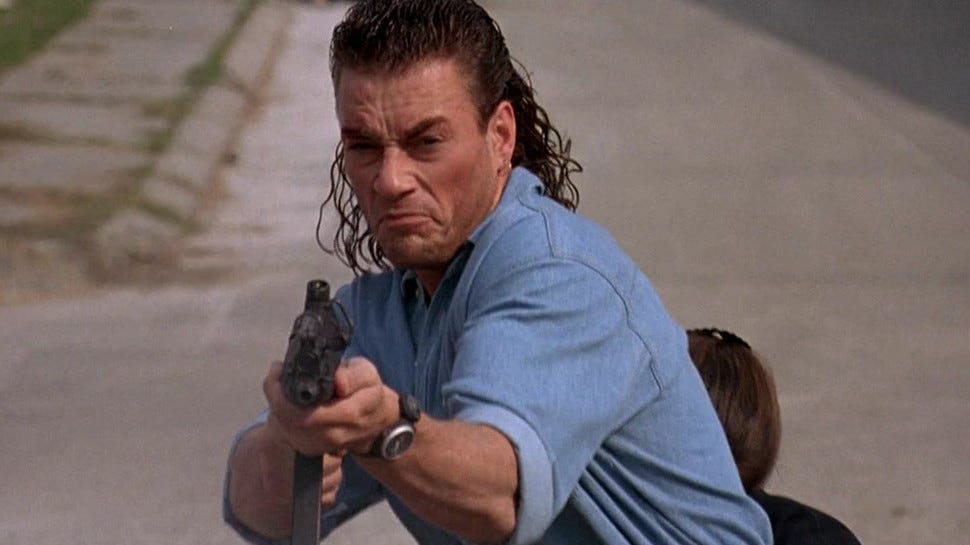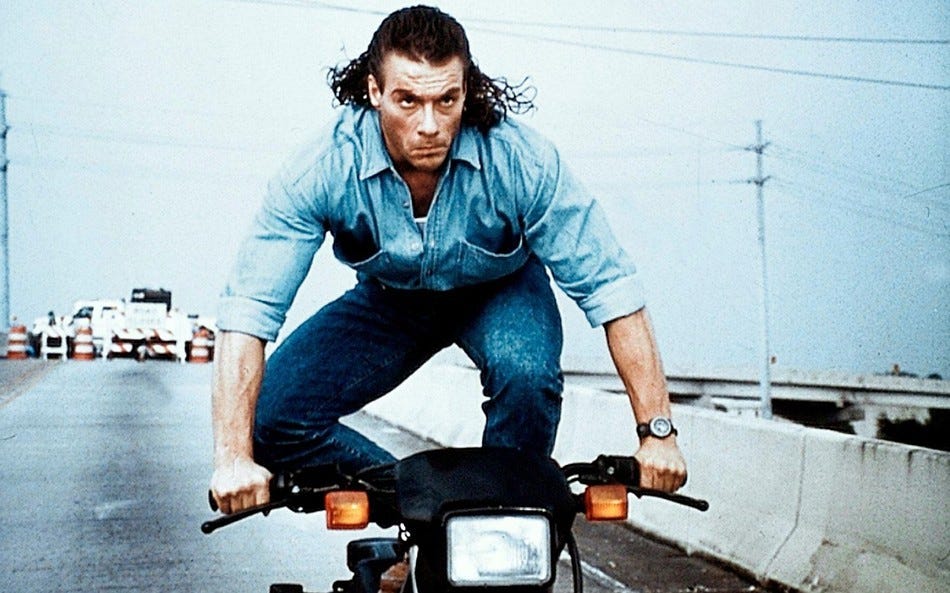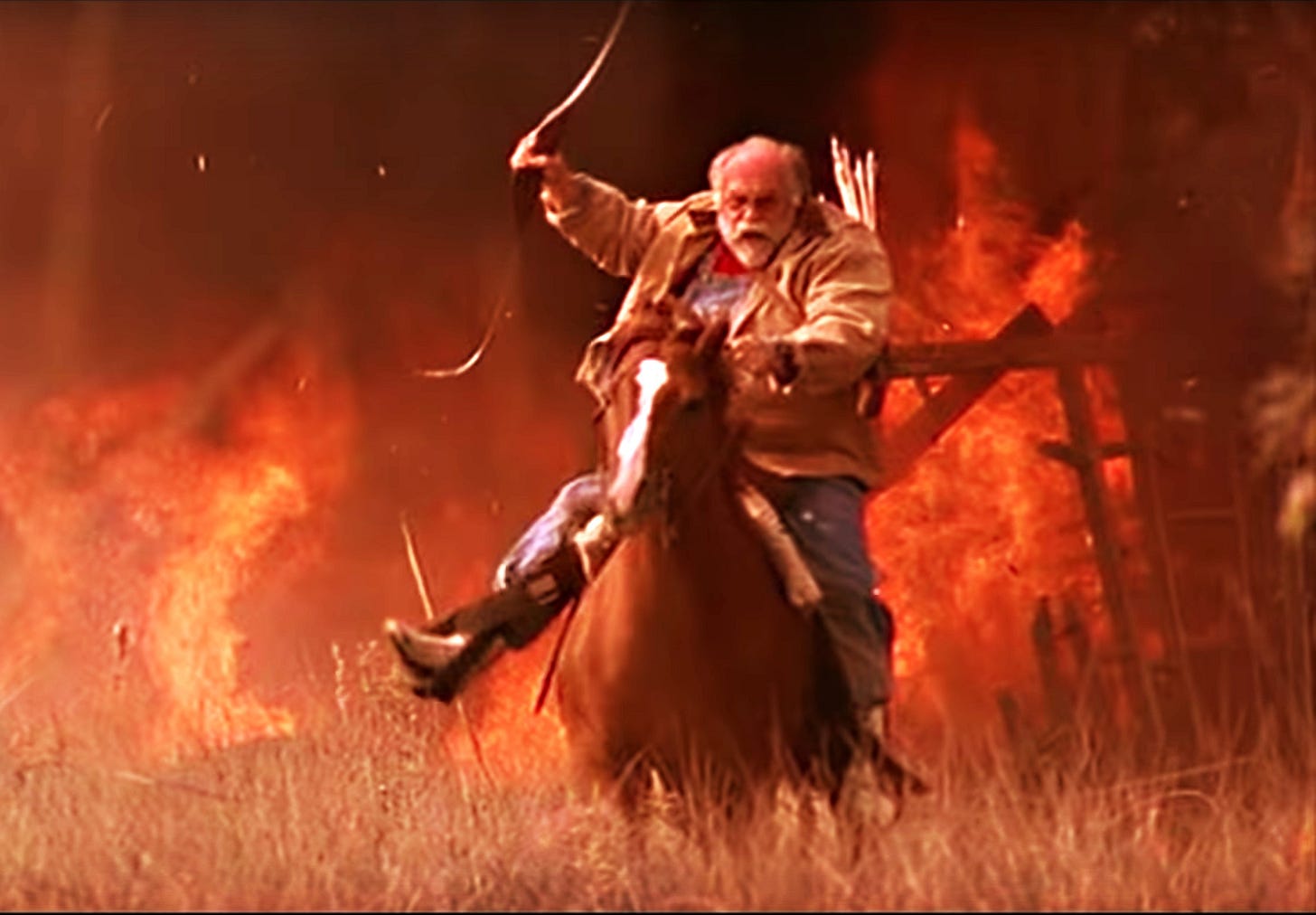I completely understand why film fans eager to see John Woo make his American action debut may have been underwhelmed by Hard Target.
In the mid-80s and early 90s, the director caused a stir among cinephiles with his sensitive, stylish and badass Hong Kong action flicks. A Better Tomorrow, Bullet in the Head, The Killer and Hard Boiled were drooled over by action lovers and passed around on bootlegged tapes. Woo’s balletic, over-the-top action sequences and charming protagonists made his shoot-em-ups equally adrenaline pumping and emotional, and many were curious what would happen when he eventually crossed paths with Hollywood.
So it’s probably not surprising that they reacted poorly when his first American movie was a Jean-Claude Van Damme vehicle.
Hard Target’s poor critical ratings, dismal box office returns and overall dismissal by Woo fans is a big reason why I hadn’t seen the film until I chose to include it in this project. Like many a young film lover, I was a huge fan of the director in the late-90s and early 00s, particularly after I was wowed by Broken Arrow and Face/Off. Rather than revisit a movie that most seemed to agree was a disappointment, I turned instead to his earlier works, and I have a ton of love for both The Killer and Hard Boiled.
But here’s the thing – any movie Woo did after Hard Boiled was going to be a disappointment. Hard Boiled is, quite simply, one of the greatest action movies ever made, even giving Die Hard a run for its money. And while Van Damme had his fans, no one would pretend he had the charisma of Woo’s previous collaborators Chow Yun-fat and Tony Leung, especially when the go-for-broke nature of the Hong Kong films was sure to be hampered by a studio cautious to hand the reins over to a director new to working with American casts and crews.
But I walked away pleasantly surprised: Hard Target, while flawed, kind of kicks an unholy amount of ass. It’s dumb as a pile of bricks, but it’s also an absurd amount of fun. And while you can feel the execs at Universal trying to constrain Woo, his flourishes and fetishes are all there on the screen. Plus, Chow Yun-fat never punched a snake in the face and then bit off its rattle.
Rich vs. poor
Van Damme stars as Chance Boudreaux, a drifter in New Orleans who we meet scrounging for change at a local diner. He crosses paths with Nat Binder (Yancey Brown), who’s searching for her father, a homeless veteran. Chance is initially hesitant to work with the stranger but needs the money. The two begin searching for Nat’s dad and it quickly becomes apparent that he fell afoul of a sinister company headed by Lance Henrisken that allows customers to hunt the less fortunate. Chance vows to get to the bottom of the mystery and take down the people who are hunting the homeless.
A loose remake of the film adaptation of The Most Dangerous Game, Hard Target isn’t the most original movie. And it’s definitely a step down for Woo, whose violent action movies were often tempered by soulfulness and centered on themes of camaraderie, loyalty and guilt.
There’s not much of that in Hard Target, although its theme of class warfare is an interesting addition. Henriksen’s company specifically recruits homeless veterans as the subject of its hunts, requiring that they have no family or friends to connect them with the crime (Nat’s dad slips through the cracks). They give them a money belt filled with $10,000 that they’ll be able to keep if they can evade the hunters and get to the river. Henriksen’s character waves away in his moral qualms by saying that hunters and military men are paid to kill but regular guys never get that chance; in reality, they simply view the poor and disenfranchised as less-than human. In the opening sequence, we watch as the hunters chase down their mark and beat him nearly to death before the client goes in for the kill. There’s an interesting thread about how the poor are seen as expendable by the rich, and Chance is the hero going up against a rich, mansion-dwelling sadist (when he finally has Henriksen in his sights and is asked why he won’t give up, he says “the poor get bored, too.”).
I’m not going to pretend any of this is nuanced or artistically handled, but you don’t go to a John Woo film for subtlety. It’s an interesting thematic hook to hang the story on, and does its job of creating sympathetic heroes and despicable villains (particularly The Mummy’s Arnold Vosloo as Henriksen’s gleefully sadistic right-hand man). The bad guys are millionaires eager to kill just to “feel alive;” the good guys are drifters, vagrants and burnouts. It draws pretty easy lines.
The story itself doesn’t quite engage the themes more than I was able to in the first two paragraphs, and the film’s biggest flaw is that it spends a great deal of time spinning its wheels in the first 45 minutes. There’s probably a more efficient way of drawing Chance into the story and upping the conflict between him and Henricksen – why not just have Chance be one of the hunted from the start? And Nat’s mystery loses much tension when we already know her father is dead (he was the one killed in the film’s opening), and her character doesn’t exist to do much more than give exposition and pull Chance into her story. There are some lingering shots that suggest they have a bit more of a relationship, but any romance seems to have been lost to edits. Which is probably fine; Brown and Van Damme don’t have a great deal of chemistry anyway, and the film’s greatest love story is between the camera and its star.
Van Damme Good
It’s quite possible that Hard Target is my first Jean-Claude Van Damme film.
I’ve seen snippets of Bloodsport, and I know he was in one of the Expendables movies. But I don’t think I’ve seen anything that starred him from start to finish. I was fairly young when he was in his heyday, and the truth is that both Jean-Claude Van Damme and Steven Segal were basically seen as the K-Mart brands of Arnold Schwarzenegger and Sylvester Stallone. The latter two were the bruisers who starred in the big budget blockbusters; JCVD and Segal were in low-rent, ludicrous movies that existed to play for two weeks in August or September before becoming cable mainstays. The line was that they couldn’t act and that their movies were fairly forgettable, redeemed by a few decent action sequences.
But I might have to rethink that assumption, because I quite enjoyed Van Damme here. It’s true that he’s not a master thespian; his delivery is wooden and he lacks the charisma and self-awareness that Schwarzenegger used to his advantage. But there’s a stoic nature and presence to Van Damme that Woo captures that elevates him above his usual direct-to-video status. Chance doesn’t say much – and I’d argue the film would be better if he said less and the film cut his one-liners – but there’s something in Van Damme’s eyes that captures his empathy and intelligence.
Woo originally wanted Kurt Russell for the role – even though Universal had purchased the script hoping for it to be a Van Damme movie – and I can see how a more serious and scaled-back action movie would benefitted from his involvement. But no one goes to Woo for scaled back, and the director wisely amped up the action scenes once JCVD signed on. And whatever his weaknesses as an actor, Van Damme is fantastic in the action sequences, and game for the badassery Woo allows him to commit. There’s a set piece where Chance stands on a motorcycle, shooting his gun as he rides toward the henchmen; shortly after, when the motorcycle has sprung a leak, he tosses it at another bad guy and shoots it so it explodes. The greasy mullet is also a nice touch; a little less dialogue, and this would have been an iconic role.
But that’s not surprising. Woo has always been fantastic with actors and found ways to capitalize on their strengths. Face/Off has tremendous action, but the crazy-go-nuts performances from Nicolas Cage and John Travolta take it into the stratosphere. And Hard Target has a great ensemble that saves the weak screenplay. I think Brown is largely miscast and forgettable, but I really liked Kasi Lemmons as the cop who helps Chance and Nat. While the rest of her colleagues are outside on strike, she’s lighting a candle in a small cake and singing “Happy Birthday” to herself; it’s a small role, but Lemmons is so enjoyable in it that it’s sad when her character is killed halfway through the film.
Vosloo, who would be best-known for The Mummy films later in the decade, is terrifying and intense as the henchmen who gets off on inflicting pain; it’s a fun performance, and he and Van Damme get to share the back-to-back, pre-shootout dialogue seen that’s a Woo trademark (think the Travolta/Cage “oh well; let’s just kill each other” scene in Face/Off). And Henriksen, always such a reliable scumbag in the ‘80s and ‘90s, is steely perfection as the head of the evil hunter-for-hire business. I wish the character were fleshed out a little more – apparently an earlier cut had more for Henriksen to do – but he’s a lot of fun here, and he conveys a good deal about his character in a scene where he plays the piano so hard it seems like he wants to murder it.
And just two months after being a good ‘ol boy intimidator in The Firm, Wilford Brimley saunters in as Chance’s Cajun uncle in the back half of the film and delivers a great dose of crazy. When I started doing this series, I was eager for the surprises it would hold, particularly in movies I’d never seen. But I wasn’t prepared for the pure crazy rush of watching Brimley ride away on horseback, in his long johns, as a moonshine explosion erupted behind him. This, my friends, is cinema.
Woo-hoo
Thirty years on, I do understand why critics didn’t care for this film – it’s dumb and, at the time, probably seemed like just another braindead actioner. And I can understand why some things might have been too silly for mainstream audiences – again, at one point, Chance punches a snake in the face, bites off its rattle, and then leaves the snake as a booby trap. But what I don’t understand is the line I’ve been fed for years about this not feeling like a John Woo film.
I mean, it’s not prime Woo. The Killer has an earnestness and poetry that this film never even attempts, and Hard Boiled goes as nuts as an action movie can go. Woo would bring a bit stronger grasp to the action sequences in 1995’s Broken Arrow, but that film also feels a lot safer than Hard Target. Face/Off is his only American film that feels like it matches the grandeur and unhinged rush of his Hong Kong thrillers.
But Hard Target, particularly in its action sequences, does feel like Woo. The slow motion is there, and it’s arguably some of his best use of it simply because so much of Van Damme’s action uses his body as a lethal weapon instead of firearms; there’s something incredibly cool about a kick delivered in slow motion. The doves are there and just as silly as ever; at one point, a dove directs Chance to a clue about Nat’s father. And while I don’t think the film leans as hard as it could into the duality between Van Damme and Henriksen’s characters, the class subtext does heighten the tone a bit.
And mostly, the action here is really solid. The motorcycle chase features some fantastic stunt work, and Woo wouldn’t have this much fun with a chase scene again until Mission: Impossible 2. Few filmmakers have ever captured the kinetic energy of an explosion like Woo, who seems eager to blow up as much as he can (fun fact: my first-ever film review, in high school, was for Broken Arrow, which I lauded because “so much blows up”). And the film’s climax is a thing of beauty, set in a warehouse filled with Mardi Gras floats that send debris flying as the bullets rip and bombs go off. I think the film kind of undercuts itself by letting Henriksen’s death end on a joke, but whatever. Hard Target ain’t art, but I had a ton of fun with it, and could see it being one I go back to over and again for some dumb fun.
Audiences didn’t quite agree with me. In the U.S., opened behind The Fugitive (which is understandable), but by week two it dropped and was behind both Ford’s film and the forgettable Dennis Quaid comedy Undercover Blues. It ended up grossing only $30 million in the United States, and actually made more internationally, where it picked up another $40 million. Which, on a $25 million budget, isn’t bad in the long run, and it did allow Woo to keep directing in the United States. Broken Arrow was a bigger hit and Face/Off is style a favorite. And as a result, it introduced more people to his Hong Kong filmography (currently, the director is actually remaking The Killer for Peacock, which could be interesting).
In many ways, Hard Target is the perfect August actioner. It’s weird, it’s silly and it’s perfectly fun. It’s definitely worth a look and another great surprise from this retrospective.








